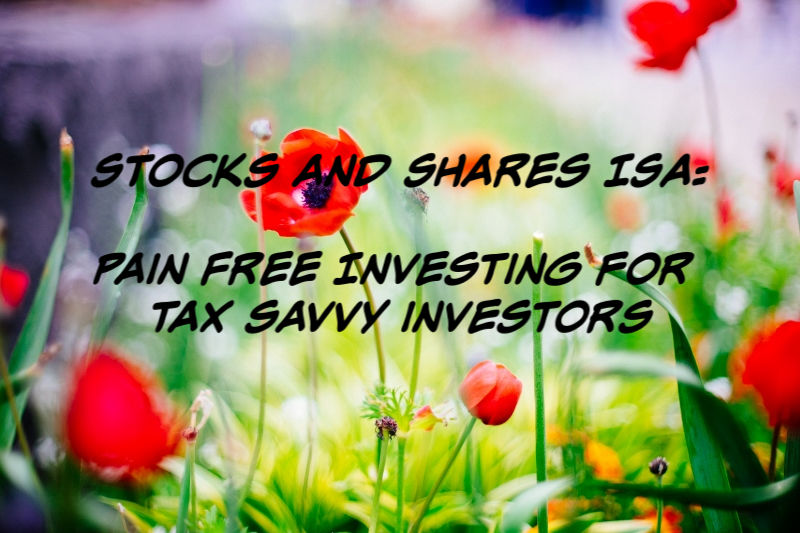Stocks and Shares ISAs are the best investment you could make and here is, in a nutshell, why:
- Stocks and shares ISAs are tax-free, meaning you won’t be taxed on investment growth and drawdown.
- Stocks and shares ISAs are versatile and can accommodate various investments.
- Investment ISAs will benefit anyone investing long term.
- There is an easy way to select the investment ISA that suits your needs best (I tell you about it).
- There are overlooked rules of stocks and shares ISA that you must know (and I share them with you).
Finally, after years of working hard and spending smart, you have some money in the bank.
The question is what to do with it.
You could buy your dream wheels, but this leaves your future exposed.
You could keep your money in a savings account, but you know that the interest rates are lower than inflation; you lose money guaranteed.
On the other hand, you could put your money to work and invest it; but you don’t know where to start.
You have heard about stocks and shares ISAs and find them confusing – try as you may, you can’t decide which is the best ISA for you.
You are terrified you’ll choose wrong and will lose your money and your future.
Fear and confusion paralyze you.
I understand. It is how I felt six years ago. Do you know what I did?
I learned about stocks and shares ISAs, selected the best investment ISA for me, and opened a Nutmeg Stocks and Shares ISA.
Here, I’ll share with you my knowledge and experience of stocks and shares ISA – so that you can select the best ISA for you and start investing.
You would learn:
- What are stocks and shares ISAs?
- Why are stocks and shares ISAs hassle-free investment for all?
- Who can benefit from investing in a stocks and shares ISA?
- How to select the best investment ISA for you?
- Underplayed rules of ISAs, you must know.
What are Stocks and Shares ISAs?
An individual savings account (ISA) is an arrangement available to individuals in the UK who qualify for favourable tax status. It means that you contribute to the account from your after-tax income, but any capital gains (interest earned) and withdrawals are tax-free.
It may be easier to think about ISA as a nice wrapping paper you could place around your:
- savings (Cash ISA);
- stocks and shares investments (Stocks and Shares ISA), etc.
- other investments (Innovative Finance ISA or IFISA)
Currently, there are five different types of ISA and numerous possibilities within these. You can learn more about the different types of ISA by reading this guide to ISA.
Stocks and shares ISA, also known as investing ISA, wraps in tax advantages different investment vehicles, e.g. equities, bonds, ETFs, index funds, mutual funds, etc.
I love everyone in the ISA family but am most partial to stocks and shares ISA and Innovative Finance ISA.
What investments can you keep in a Stocks and Shares ISA?
You have considerable flexibility. Here is a list of the holdings you can stash in an investment ISA:
[box] Cash. You can hold cash in your ISA while deciding what to invest it in; otherwise, it is not worth it.
Unit and investment trusts. You should be careful with these because there are conditions they must meet.
Individual stock and shares. If this is your investing game, you can place individual stocks and shares in your ISA. They must be traded on one of the recognised stock exchanges.
Index funds. Index funds are portfolios of shares in companies that represent a segment of the market (e.g. S&P500, FTSE100, etc.).
Exchange Traded Funds (ETFs). ETFs are a basket investment that comprises stocks, commodities, bonds, etc. Government and corporate bonds. These are public debt securities.[/box]
Investment ISA allowance: how much is the allowance per year, and how to use it?
The annual, tax-free ISA allowance is different from year to year. For the year 2019/20 it is £20,000.
You can divide this between:
- Cash ISA;
- Stocks and Shares ISA; and
- Innovative Finance ISA.
Why novice investors should open Stocks and Shares ISAs?
There are many investment options to choose from, and it is easy to lose your way. My rule for investing, particularly for novice investors, is simple:
- First, contribute all you can to your pension.
- Second, max out your ISA allowance.
All other investments come after these two.
Now, let me tell you why stocks and shares ISAs are good investments. In brief, investment ISAs are a good investment because they are:
- Tax-efficient;
- Liquid (largely) and flexible;
- Psychologically hard to ‘violate’; and
- Easy for beginner investors.
Stocks and shares ISAs are tax-efficient
Tax evasion is morally bankrupt. Making sure you conduct your money affairs in the most tax-efficient manner is smart.
Investment ISA is hard to beat when it comes to tax efficiency. (You can check out this comparison between stocks and shares ISA and a SIPP account, if interested. If you are short of time, I can tell you that in the long run ISA wins.)
ISAs are tax-efficient in two ways:
- When you keep within the tax-free ISA limit, which is £20,000, any investment returns and dividends are not taxed.
- There is no tax when you withdraw money from your ISA.
Yes, I know that you contribute after-tax income, but still – as investments go – an ISA is very tax efficient.
Stocks and shares ISAs are liquid and flexible
Stocks and shares ISAs are a very flexible investment vehicle.
Your choices are many.
- One choice you’ll have to make is about what to include in your ISA –value and dividend stocks, ‘basket’ investments like ETFs and Index Funds, mutual funds, or bonds.
- Another choice is whether you’d like to tinker with the content of your stocks and shares ISA yourself, or you’d rather delegate its management to the experts (will get back to this one later).
- Do you prefer fully managed ISA, or you’d rather have a fixed allocation one?
- And you ought to select an investment platform for your ISA.
Apart from that, you can transfer your stocks and shares ISA if you find a better provider or your requirements change over time.
What is important is that you don’t exceed the annual tax-free ISA allowance. Most else is flexible enough to accommodate even a fussy investor.
Stocks and shares ISA is hard to ‘violate’

How often have you ‘violated’ your savings account in the past?
You know what I mean, don’t you? You have a bit of overdraft and pull some money out of your savings.
(I do this when life throws me a money curveball.)
It is a bad idea to do this with investment ISAs – or any ISAs for that matter.
Okay, it is technically possible to draw down your stocks and shares ISA, and this could take up to 30 days to complete. Still, it is a stupid money move because:
- a) investments in a stock and shares ISA ‘take-off’ after about five years when compounding takes effect; and
- b) once you withdraw money, you cannot replace it within the same tax year, thus wasting the tax advantages of an ISA.
Investing ISAs can be great for novice investors
Many digital wealth managers offer stocks and shares ISAs using pre-set or managed investment portfolios.
Investors who have little or no experience but would still like their money to do better than lose 2% per year in a savings account or cash ISA, can start investing. They will have to look at stocks and shares ISA platforms like Nutmeg, Scalable Capital, and Vanguard.
(You can read our comprehensive and independent review of Nutmeg.)
To learn more about index funds, and how to invest in them, read this article.
Who can benefit from investing in a stocks and shares ISA?

Any investing in stocks and shares, including dressing this investment in an ISA, benefits people who can:
- Control their fear and continue investing when markets go down; and
- Invest for their long-term future.
Investing in stocks and shares ISAs must be long term to deliver the best results.
When investing in the stock market, you must expect fluctuations. Research shows that a dip in the value of the stock market of up to 10% occurs at least once a year. Dips of up to 40%, also known as a ‘bear’ market, usually occur once every four years or so.
Scary stuff, right?
Not really. History demonstrates that the market recovers from a 10% correction within weeks and a ‘bear’ within months. You must forget your fear and stay invested.
Investing in an ISA can benefit specifically:
- Experienced investors using the tax advantages if ISA;
- Novice investors who are making use of managed funds and digital wealth managers.
- Anyone who is aiming to build sustainable wealth.
How to select the best investment ISA for you?
There are many decisions to make when selecting the best performing stocks and shares ISA. In this section, we’ll discuss these in turn.
Selecting the best stocks and shares ISA provider

Many financial institutions offer investment ISAs. These roughly fall within four groups:
- Banks. While banks offer stocks and shares ISAs, they tend to rank poorly for customer satisfaction according to this Which review.
- Premium fund supermarkets. Biggest players are Hargreaves Lansdown and Fidelity Personal Investing. Originally these providers offered access to a range of investment funds; lately, they have expanded to offer shares and corporate bonds.
- Stockbrokers. These providers come from the stockbroker tradition (e.g. Interactive Investor), offering resources for stock pickers. One thing to watch for with this group of providers is their fees – they charge a stockbroker commission on top of the account fee.
- Digital Wealth Managers. These are also known as robo-advisors, and their distinguishing characteristic is that they use AI, or another form of automation, to build and balance investment portfolios. The best-known providers in this group are Nutmeg, Scalable Capital and Moneyfarm.
Vanguard as one of the worthy providers of stocks and shares ISA though it doesn’t fit neatly in any of the four groups mentioned above. You can select what you place in your investment ISA from many index funds (both stocks and shares and bonds) or select one of their pre-set portfolios.
Deciding what to hold in your stocks and shares ISA
Deciding what investments to place in your ISA depends on your experience, how much time and resources you are prepared to dedicate to managing your ISA investment, and the platform you select to host it.
If you have a history of success with dividend and value stocks investing and are a hands-on investor dedicating considerable time to managing their portfolio – or prepared to pay a hefty sum to someone to manage it for you – by all means choose individual stocks.
If, on the other hand, you lack experience or favour more passive investments your choice must be index funds and ETFs.
Similarly, the mix of stocks and bonds would largely depend on how much risk you can stomach – the higher the risk, the lower proportion of bonds in your portfolio.
Choosing how to manage your investment ISA
Here you have three choices.
You could decide to manage your stocks and shares ISA yourself. This option earns full marks for taking responsibility. The downsides are that you need considerable experience to succeed. Also, you need to dedicate considerable time to researching your investments and rebalancing your portfolio.
You can opt to have fully managed investment ISA and outsource its management to the experts. It frees your time but usually comes with relatively high management fees. And we all know that fees erode the portfolio’s gain, right?
Finally, you could decide to open a ‘passive’ stocks and shares ISA. There are three variants here:
- Investing in index and mutual funds;
- Investing with digital wealth managers using algorithms;
- Investing in fixed allocation portfolios.
My preference is for passive stocks and shares ISA – I have no intention to make investing my life and experience has taught me that passive investing mostly does better than managed funds.
The formula for selecting the best stocks and shares ISA (and provider) for you
There are elements of selecting stocks and shares ISAs we have not discussed yet – the universal investment selection rules.
According to Tony Robbins (in his book Unshakable), four rules ensure our investments are sound without being overly conservative.
Risk awareness and potential loss
When you open and contribute to, stocks and shares ISA you must be aware that it is extremely unlikely it will only make profits. There will be times when the value of your ISA (your investment) will drop.
It is likely to mirror the dips in the stock market discussed above (remember that corrections of up to 10% and ‘bear’ markets are a fact of an investor’s life).
Be aware there are risks and research the stocks and shares ISA provider meticulously. Remember to check whether the investment ISA provider is the financial conduct authority (FCA) covered.
Profit awareness or potential return
Profit awareness when selecting an ISA is important but not that easy to judge. One thing you could do is look at the historical stocks and shares ISA returns the provider has achieved.
Past performance, good or poor, is not guaranteed for the future.
Tax/fee awareness
Taxes and fees can obliterate your earned interest; when compounded, it gets rather frightening.
When you select the perfect investment ISA for you, make sure you understand all the fees and taxes you’d incur.
Watch the fees. Some managed stocks and shares ISAs can come with steep fees.
Even digital wealth managers split their fees; e.g., providers charge their fees, average investment fund costs and effects of market spread. (This is why, the fee for Nutmeg stocks and shares ISA, for instance, is not 0.75%, but it adds up to 1.01%. Call me petty, if you wish, but as you build your investment portfolio, you’d come to agree that it adds up.)
Generally, Vanguard offers the lowest fees though this can vary depending on the index funds you select; followed shortly by other digital wealth managers.
Remember: fees compound and to keep them low can make large difference to how profitable your investment ISA turns out to be.
Diversity awareness and how to diversify your investment ISA
Any investor, even a novice, must know that diversification reduces risk (there are caveats, but we won’t get into these now).
When selecting the best stocks and shares ISA for you, ensure that it is diversified across:
- Financial instruments. Your ISA investment is a portfolio of equities, bonds, real estate funds, commodities, and cash. Usually the proportions depend on your risk tolerance and the characteristics of the market.
- Industrial sectors. Holding stocks and shares of companies from one sector is risky.
- Location. Over a hundred years data illustrates that the stock market rarely collapses everywhere at the same time. If you own only UK companies (or US companies) the value of your investment may drop like a stone off a cliff edge if the economy of the country tanks. When you own shares in companies from different countries, your portfolio may lose value, but it is highly likely the losses will be much lower because the effects of a sluggish economy in country A are offset by economic growth in country B.
The best stocks and shares ISA formula:
[box]Best Stocks and Shares ISA = (Relatively) low risk + high (potential) returns + low fees + high diversity[/box]
Stocks and shares ISA rules too important to ignore

I’m usually careful to learn the rules – it is handy when I want to break them intelligently. I’ve been investing in stocks and shares ISA for nearly a decade.
You’d think I know the rules of stocks and shares ISA like the back of my hand, right?
Not so, friend. My confidence evaporated when in 2018 we nearly gaffed big time because we didn’t realise you cannot invest in two ISAs of the same type in the same tax year. Go figure!
Research is my retreat; the fruits of researching the rules of ISA too important to ignore are my gift to you.
These rules I’ve framed as questions.
Can you sell your stocks and shares ISA?
Yes, but…
Do you remember that a stocks and shares ISA is like the wrapping paper around a lovely piece of chocolate? You can wrap any chocolate in it – index funds, ETFs, individual stocks, and a combination of these.
You can always sell the chocolate. Whether you should sell it is an entirely different matter.
Most people sell their stocks and shares ISA when they:
- need the money;
- try to minimise their loss when the value of the ISA has declined.
You can’t do much if you need the money though dipping into your ISA is a very bad idea.
Selling because you fear loss, however, you must avoid at all cost. Remember that statistically downward stock market corrections recover in three to twelve months.
In brief: yes, you can sell your stocks and shares ISA, but you shouldn’t.
Can you withdraw your money from an investment ISA?
Yes, you can.
Because the investments you hold in your ISA must be sold, getting the money can take up to thirty days. Usually, it takes less than that.
What would happen to your stocks and shares ISA if/when you die?
Good question though I hope it won’t come to that anytime soon.
According to the old rules of stocks and shares ISA, in case of death, your ISA would have lost its tax-free status. Your partner (or any beneficiary to your estate) would have had to start paying tax on any returns or income earned from the ISA.
This rule changed in April 2015.
According to the amended rules of investment ISAs, the tax-free benefits can be passed on by increasing the beneficiary’s tax-free allowance for the year of death to include the value of the inherited ISA.
For instance, if I die before March 2020, John’s ISA allowance for 2019-2020 would be:
£20,000 + value of Maria’s ISA
Rest assured that the tax benefits of ISA won’t be lost in case of death.
Can you have more than one stocks and shares ISA?
This question has a short answer and a longer one.
In brief, yes can have more than one stock and shares ISA.
Still, you must understand two things:
- You can open one stocks and shares ISA, with a different provider, per tax year.
- During a tax year, you can contribute to only one stocks and shares ISA.
You can, however, split your ISA allowance between cash ISA, investment ISA and innovative finance ISA if it doesn’t exceed the yearly allowance (currently £20,000).
It doesn’t make much sense, I know. Still, splitting your yearly contribution between two stocks and shares ISAs may result in losing the tax benefit on one of them.
In brief: You can have more than one stocks and shares ISA and can contribute to only one during any given tax year.
Is your money safe in a stocks and shares ISA?
There are risks involved in every investment.
Your stocks and shares ISA is as risky as the investments you have in it.
(You can learn more about the risks investing presents here.)
I’d also recommend you open a stocks and shares ISA with a provider covered by the Financial Services Compensation Scheme (FSCS).
How to calculate stocks and shares ISA fees?
Most people miscalculate the fees they pay for their stocks and shares ISA.
It took me some time to realise that providers charge three kinds of fees:
- Fees for administering your account;
- Investment fund costs; and
- Market spread costs.
It doesn’t look much, but it adds up. And it is always good to know how much your stocks and shares ISA costs you.
Can you have joint stocks and shares ISA?
The answer is simple: no.
ISA is an individual account, and you cannot open one in joint names or for someone else.
That’s it.
Can you open stocks and shares ISA with a poor credit score?
Yes, you can.
Some people believe that ISA providers refuse to open an account on the grounds of a poor credit score. It is not so – your credit score is important when you want to borrow money, not when you save money.
Who can open stocks and shares ISA?
Any UK resident over 18 years old can open, and contribute to, stocks and shares ISA.
What will happen to my stocks and shares ISA if I move abroad?
If you open stocks and shares ISA and then move overseas you cannot contribute beyond the tax year when you moved. You should also tell your ISA provider that you are no longer a UK resident.
When is the financial year-end?
In the UK, for personal finance purposes, the financial year starts on April 6 and ends on April 5.
It means that your deadline for contributing to your stocks and shares ISA for the current (personal) financial year is midnight on April 5th , 2020.
Final thoughts
It is time to put what you’ve learned about stocks and shares ISA into action.
You learned that stocks and shares ISA is a:
- Tax-efficient wrap around various investments.
- An investment that can save you, as a novice, growing pain.
You also learned:
- How to select the best stocks and shares ISA for you (using the Best Stocks and Shares ISA formula); and
- The rules of investment ISA that you can’t ignore.
Research and compare some investment ISAs on offer, assess whether they match the future you envisage, and start contributing. After that, patience, regular contributions, and getting hold of your fear of loss are all you need for investing success.

Very hard to understand
@Susan: Did this article help? You can also contact me privately and we can talk about it – would love to help you with ISAs.
Read article thankyou lots of great information
@Jeanette: Thanks and glad I could help. Let me know if you need any further help on figuring out, and opening, an ISA.
I’ve been thinking more about this lately, and this is really helpful, thank you!
@AS: Opening a stocks and shares ISA is a must today. Good luck.
Very useful information.
A query: if I have a stocks and shares ISA with more than £85k, managed by a bank, e.g. Barclays and the bank collapses, would I lose the money above £85k (the FSCS limit) be lost?
If so, would you suggest it would be better to open a separate stocks and shares ISA with another bank.
@SC: Yes, if Barclays collapses you will receive a compensation of only £85K. The probability of Barclays collapsing is very slim (it is the central corporation in the world). Or you may consider opening other ISA but please check carefully which bank administers (backs) the ISA provider – sometimes the same bank backs different ISA providers.
Thank you. That’s helpful.
My lack of knowledge in this area is why the question arose. My thinking was that Barclays don’t actually own the stocks and shares – they only act as an intermediatory (?) so whichever institution ultimately holds the stocks and shares should still be able to issue me with, e.g. a share certificate?
@SC: Correct. But they hold your money and the FSSC guarantees return of it to a certain limit.